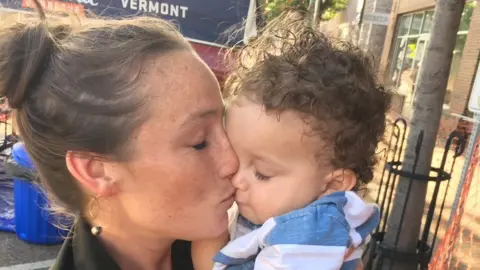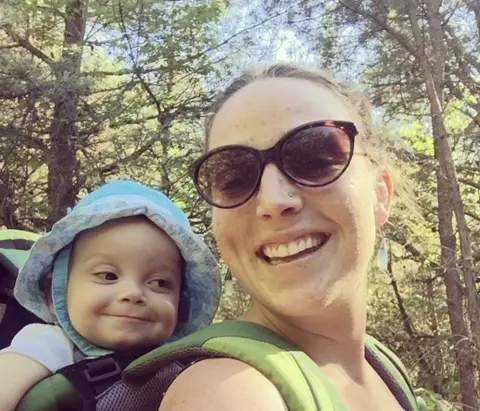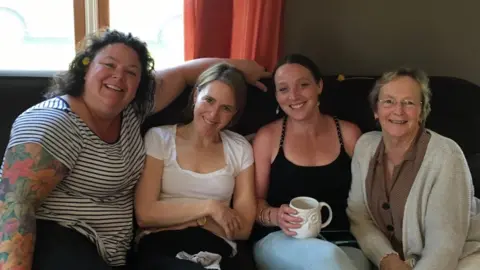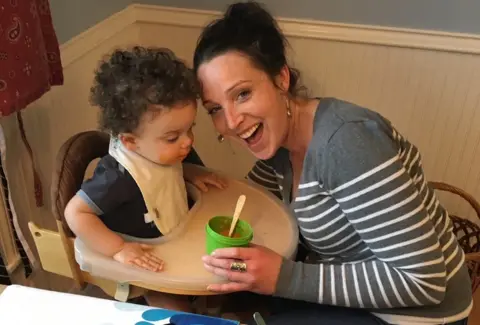The life and death of Maddie Linsenmeir
 Maura O'Neill
Maura O'NeillOn 14 October, an obituary about a young woman from a small American town went viral on social media.
It described the life and death of 30-year-old Madelyn Linsenmeir, Mum to two-year-old Ayden.
Her sister Kate O'Neill wrote the obituary in a local newspaper. She told the BBC it was to show a human face behind a crisis plaguing America.
After taking a painkiller, at the age of 18, Madelyn, Maddie to her family, became addicted, and eventually died from an overdose in Burlington, Vermont.
The love and support her family received when the tribute went viral has been "wonderful", Kate says, adding: "We hope this goes some way to reducing the social stigma of addiction."
On Wednesday, President Trump signed a new bill to help tackle the epidemic, but Maddie's family says the country is failing to support the 2 million Americans addicted to opioids, a class of drug that includes heroin and prescription drugs like painkillers.
Last year, 72,000 people in America died from a drugs overdose, the highest number in history. The sharpest increase were deaths from fentanyl.
 Maura Linsenmeir
Maura Linsenmeir"My sister was a beautiful, bright woman. She had wanted to star in Broadway musicals and she had the voice for it. She was exuberant in her love and affection for everyone," Kate, who is 46 and lives in Philadelphia, says.
Maddie first took what turned out to be a highly addictive painkiller called Oxycontin at a party when she was a teenager.
She quickly became an addict, and in the US, drugs are easy to get hold of. Authorities have seized enough fentanyl to kill every single American.
American doctors widely prescribe opioids for pain management, and pharmaceutical companies are allowed to advertise drugs on television, including in primetime slots such as the Superbowl in 2015.
"Loving someone addicted to drugs is really tough and being addicted to drugs is really hard," Kate explains.
"Being a drug addict is the same kind of drudgery as normal life - getting up, going to work, paying bills. But it is much harder - you're trying to get up and get the money for a score."
'Very low lows'
In the 12 years between that first pill and her death, Maddie tried many times to get clean.
"Whenever she was using she wanted to end it. Sometimes it would be every couple of months, and she would hit very low lows," Kate explains.
"She tried so hard, and that's the thing that people don't understand - America makes it very hard to get clean."
Maddie was failed by institutions and systems that should have helped her overcome her addiction, her family says.
 Maura O'Neill
Maura O'Neill"Any doctor in this country can prescribe highly addictive painkillers, but to prescribe medicine shown to help patients recover, doctors have to get a special waiver.
"It's very hard to get methadone [a heroin substitute that can help reduce addiction over time], people have to stand in line in a clinic. How can you hold down a job like that?"
Kate says there were many times when her sister drove hours across Vermont state to get a bed in a recovery centre but when she arrived, it was given away or there was none available.
When in jail for minor drug offences, there was no medically assisted treatment.
'Not a person'
This repetitive cycle was interspersed with moments of great joy and happiness for the family.
"One of my best memories is when she had Ayden - seeing how much she loved him, her singing to him. She would take him for walks to the woods or lake, no matter the weather. It was beautiful, she loved being his Mum," Kate explains.
Ayden will now be adopted by Kate's sister Maura and her husband.
Kate says that if Vermont, the state that elected left-wing Senator Bernie Sanders, was unable to help Maddie get clean, then she believes there is currently little hope for the rest of America:
"They failed her and continue to fail addicts."
She advocates safe injection sites or harm reduction programmes that aim to reduce the negative consequences of drug use, including overdose.
But these programmes are not widely supported by the authorities. "They don't want to condone people taking drugs," Kate believes.
 Maura O'Neill
Maura O'NeillIn September, the Vermont Governor's opioid council rejected proposals to open a safe injection site. In Vancouver, Canada, opening a safe injection site in 2003 led to fatal overdoses declining by 35% in the surrounding area.
After Maddie's obituary went viral, Burlington Police chief Brandon del Pozo responded on Facebook thanking the family and writing that he was "tired of arguing with reactionaries" who opposed progressive solutions to addiction.
Kate says people have stopped seeing drug addicts as people.
Describing officials and doctors who visibly changed their attitude to Maddie once they learned about her illness, she says she was routinely shocked by the lack of empathy for addicts:
"Police officers, lawyers, correctional officers - when they found out someone is an addict, they see a junkie, not a person with a disease who is suffering."
Kate is at pains to point out that although her young, good-looking sister has attracted global attention, that shouldn't overshadow the plight of the thousands of less photogenic addicts who are also suffering.
"If people feel empathy for Maddie, they should feel that for addicts at their lowest, who may be begging on the streets or injecting under bridges."
She also wrote the obituary to speak to people working in the system who helped her sister.
"She was touched by individuals who just went above and beyond.
"After he read it, a man sent us a message saying he had been sober 18 years, and he would stay sober that day for Maddie."
